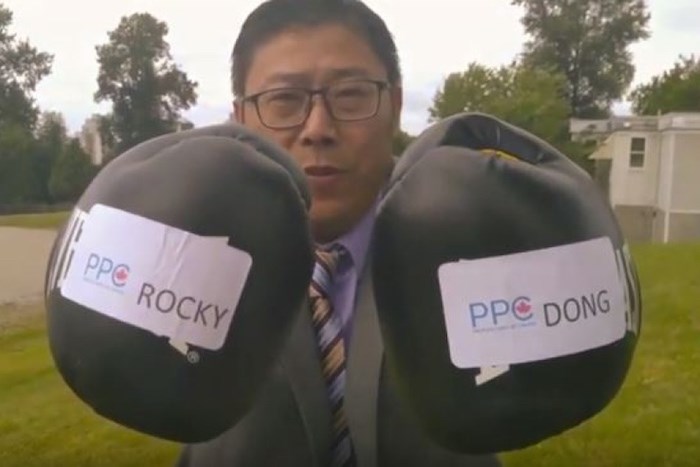His name is Rocky Dong – “not Rocky Balboa,” as he clarifies in the opening of his first campaign video.
The People’s Party candidate in Burnaby North-Seymour nevertheless dons boxing gloves to take on his top political issues. Punching a padded tree, he exclaims with each blow: “High cost of living! High personal income tax! We will eliminate the carbon tax! No more unvetted immigration! We will end supply management! No more corporate welfare!”
 Rocky Dong, People’s Party candidate in Burnaby North-Seymour, dons boxing gloves in his first campaign video. Screenshot
Rocky Dong, People’s Party candidate in Burnaby North-Seymour, dons boxing gloves in his first campaign video. Screenshot
The humourous clip suggests Dong and the PPC don’t take themselves too seriously, but it remains to be seen whether voters will take the new party seriously come election day in October. And its ability to break through could depend on whether it finds an appetite for its unique blend of populism and libertarianism, according to one political scientist.
For #respect, #responsibility, #freedom and #fairness, please welcome your new advocate for #BurnabyNorthSeymour, Mr. Rocky Dong! On behalf of @peoplespca and representing @MaximeBernier, @Rocky12134860 will support your rights and fight against what makes life harder!#PPC2019 pic.twitter.com/KZvuDNbI3p
— PPC Burnaby North-Seymour (@NorthPpc) June 19, 2019
Dong is joined by fellow PPC candidate Al Rawdah, another businessman new to politics, in Burnaby South. Both men told the Burnaby NOW they are confident the PPC’s platform promising low taxes, reduced immigration and an end to supply management will break through in Burnaby this fall.
The PPC has yet to elect a member of parliament since it was created by former Conservative Maxime Bernier last year. Its high watermark thus far came in the Feb. 25 Burnaby South byelection, where its candidate, Laura-Lynn Tyler Thompson, came in fourth with 10.6 per cent of the vote. In three other byelections, PPC candidates have come in fifth or sixth, averaging just over two per cent support.
“When some things start, they take time to get real momentum. It's just like an automobile; it takes time,” Dong said.
Dong said he voted for Beech in 2015 out of a desire to defeat the Conservative government of the day, but now, he said, Canadians have something to vote for, rather than against.
Asked what he thought the top issues were in Burnaby North-Seymour, Dong first mentioned immigration. A central theme of PPC messaging has been its call to reduce the number of migrants allowed into the country each year.
Dong, a Chinese immigrant who came to Canada in 2001, said he wants to see stricter background checks for both immigrants and refugees.
“Some immigrants maybe also need to go through a face-to-face interview,” he said. “We can make sure every immigrant is a good person; they will not jeopardize our society.”
Dong said immigrants can retain their cultural practices but should assimilate to Canadian values. Using an analogy, he said unity should trump diversity to make for a stronger society:
“If I give you five chopsticks, you can break the chopsticks one by one. If ... you bundle (them) together, you try it, it's hard.”
Rawdah, who was born to Lebanese immigrants in Edmonton, struck a similar tone on immigration and diversity.
The Burnaby South candidate said he thinks all migrants should be required to attend a class that teaches “our culture, our beliefs.”
Asked to name an example of something newcomers need to learn about, he said people from Turkey may not understand that Canadians are more reserved in public and less likely to strike up a conversation with a stranger.
Stewart Prest, a Simon Fraser University political scientist, said the PPC’s rhetoric on immigration is “forcing into the open a discussion that we really haven't had before in Canada.”
“There's been close to consensus position among all Canadian political parties that immigration is a good thing for the country,” he said.
He said Thompson, the former Burnaby South byelection candidate who plans to run in Alberta this fall, appeared to capitalize on a “unique community dynamic” in the aftermath of the alleged murder of local teen Marrisa Shen.
The man accused of murdering her is a Syrian refugee. No publicly available evidence suggests Canadian authorities missed red flags – such as a criminal record – in vetting him, but Thompson used the case as evidence Canada has lax security checks for migrants.
Prest believes it was this messaging and an ability to draw on a network of socially conservative church congregations that likely led to Thompson’s significant 10 per cent showing at the polls in February.
“That was the strongest indication that (the PPC) may be able to play a role in the upcoming election. Everything since then suggest that their impact is going to be very limited indeed on a national scale,” Prest said, referring to results in other byelections and national polling that has the party hovering around two or three per cent.
One of the PPC’s major hurdles to gaining more widespread support could be its mix of right-wing ideologies, Prest said.
On one hand, he said, the party is classically libertarian – calling for dramatic tax cuts, allowing partial privatization (two-tier) health care and ending supply management. On the other hand, he said, the PPC’s platform on immigration and diversity would require a more heavy-handed role for government in daily life.
“It seems like they're articulating two really different ideas of what the state is and what the state is for at the same time. I don't think they can fully be reconciled,” he said.
But Rawdah and Dong both expressed confidence they would be able to rally support behind a fresh message and approach in Canadian politics.



